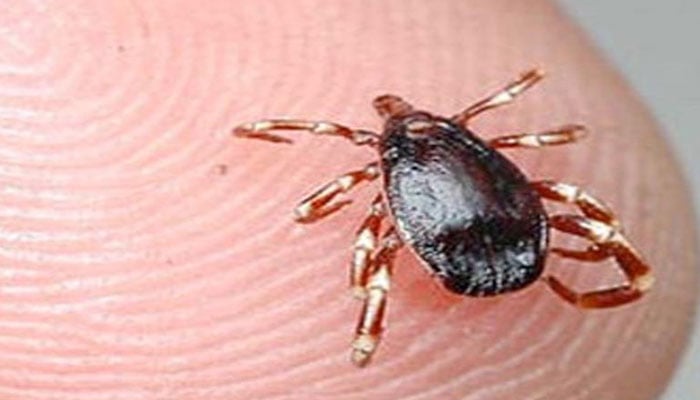Another Congo fever patient dies
The tick-borne Congo Crimean Hemorrhagic Fever (CCHF) continues to haunt Karachiites, as another patient succumbed to the complications of viral infection at Ruth KM Pfao Civil Hospital Karachi (CHK) on Saturday, Sindh health department officials said.
“Fifty-year-old Habib Khan, a resident of Lyari and a rickshaw driver by profession, was brought to the CHK with fever, nausea, vomiting and body ache. The patient was brought to the CHK Emergency on Friday night and during treatment he expired on Saturday,” an official of the Sindh health department said. Although the patient was suffering from malaria and Hepatitis C, doctors suspect he had died due to complications of CCHF, he added.
If confirmed by the lab test, this would be the 17th death due to the tick-borne viral disease in Karachi this year. In the month of August, 10 people had died due to the deadly viral infection in Karachi, officials said, adding that now ticks carrying the deadly Congo Crimean virus had infected animals and cattle in Karachi and, as a result, cattle farm workers and butchers were contracting the deadly disease on a regular basis.
Experts say Congo Crimean Hemorrhagic Fever is a lethal viral infection that is transmitted to humans from animals, especially cattle and livestock which have ticks carrying the lethal virus attached to their bodies.
Infected patients of CCHF are kept in isolation wards to prevent other patients, doctors and paramedics from contracting the viral infection. Mortality is around 40 percent, especially when patients are brought late to tertiary-care health facilities.
Director General Health Sindh Dr Masood Solangi said another patient, Muhammad Dad, 62, a resident of Karachi, was also battling for life at Aga Khan University Hospital after being infected with CCHF, and added that a team of experts was investigating both the CCHF cases in the city.
“I have also directed for case definitions circulation of CCHF/Congo virus to all health care providers and distribution of infection prevention/control material to all slaughterhouses. In the meantime, I have issued directives for decontaminating ruminants and their stables in affected area and conduct a health education campaign in the affected area,” Dr Solangi said, adding that strengthening of the surveillance system for CCHF and the need to develop a link between the reporting hospital and the health department for timely reporting of any such future cases had also been highlighted.
On the other hand, Executive Director JPMC Dr Seemin Jamali said two confirmed cases of CCHF had also been brought to Jinnah Postgraduate Medical Centre and they were provided proper treatment and discharged after they recovered.
“Two young patients, Khurram and Sharif, who were both young butchers from different localities of the city, were brought to the JPMC with multiple symptoms and signs of CCHF and lab tests also confirmed the diagnosis. Both were provided treatment and discharged after complete recovery,” she added.
-
 Travis Kelce Plays Key Role In Taylor Swift's 'Opalite' Remix
Travis Kelce Plays Key Role In Taylor Swift's 'Opalite' Remix -
 How Jennifer Aniston's 57th Birthday Went With Boyfriend Jim Curtis
How Jennifer Aniston's 57th Birthday Went With Boyfriend Jim Curtis -
 JoJo Siwa Shares Inspiring Words With Young Changemakers
JoJo Siwa Shares Inspiring Words With Young Changemakers -
 James Van Der Beek Loved Ones Breaks Silence After Fundraiser Hits $2.2M
James Van Der Beek Loved Ones Breaks Silence After Fundraiser Hits $2.2M -
 Disney’s $336m 'Snow White' Remake Ends With $170m Box Office Loss: Report
Disney’s $336m 'Snow White' Remake Ends With $170m Box Office Loss: Report -
 Travis Kelce's Mom Donna Kelce Breaks Silence On His Retirement Plans
Travis Kelce's Mom Donna Kelce Breaks Silence On His Retirement Plans -
 Premiere Date Of 'Spider-Noir' Featuring Nicolas Cage Announced
Premiere Date Of 'Spider-Noir' Featuring Nicolas Cage Announced -
 Pedro Pascal's Sister Reveals His Reaction To Her 'The Beauty' Role
Pedro Pascal's Sister Reveals His Reaction To Her 'The Beauty' Role -
 Kate Middleton Proves She's True 'children's Princess' With THIS Move
Kate Middleton Proves She's True 'children's Princess' With THIS Move -
 Paul Anka Reveals How He Raised Son Ethan Differently From His Daughters
Paul Anka Reveals How He Raised Son Ethan Differently From His Daughters -
 'A Very Special Visitor' Meets Queen Camilla At Clarence House
'A Very Special Visitor' Meets Queen Camilla At Clarence House -
 Jodie Turner Smith Shares One Strict Rule She Follows As A Mom
Jodie Turner Smith Shares One Strict Rule She Follows As A Mom -
 Hailey Bieber Reveals KEY To Balancing Motherhood With Career
Hailey Bieber Reveals KEY To Balancing Motherhood With Career -
 Photo Of Jay-Z, Other Prominent Figures With Jeffrey Epstein Proven To Be Fake
Photo Of Jay-Z, Other Prominent Figures With Jeffrey Epstein Proven To Be Fake -
 Hillary Clinton's Munich Train Video Sparks Conspiracy Theories
Hillary Clinton's Munich Train Video Sparks Conspiracy Theories -
 Fans Slam Talk Show Host For 'cringe' Behavior In Chris Hemsworth Interview
Fans Slam Talk Show Host For 'cringe' Behavior In Chris Hemsworth Interview




